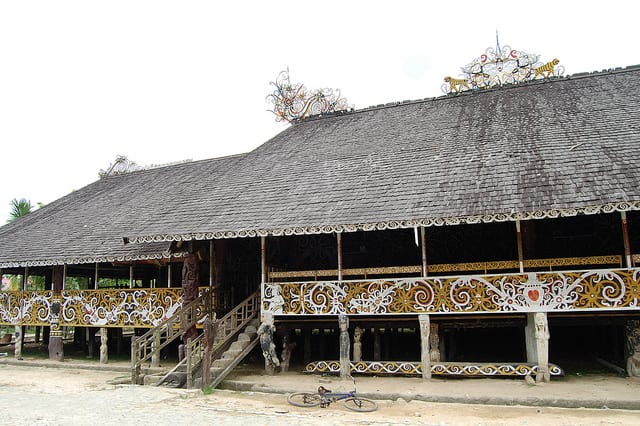
Becoming Dayak Muslim in East Kalimantan
Mufdil Tuhri – 2 August 2018
Holding and maintaining both religious and ethnic identities may create tensions as to how to deal with some complex paradoxes and the (in)separability of the two. In the Indonesian context, this tension can be found in such examples as between Islam and the Nias in North Sumatra and between the Dayak and Islam in East Kalimantan.
Yuyun Sri Wahyuni in her 2011 master’s thesis at CRCS UGM entitled “Dayak Islam: The Reemerging Identity of Dayak East Kalimantan Indonesia” problematizes ethnicity perceived to be inseparable from religion. According to her description, previous researchers have tended to follow the common association that a Dayak is always a Christian and a Kutai is always a Muslim. Any Dayak who converts to Islam will not only change his/her religion but also transform his/her whole ethnic identity into Kutai (Malay). Wahyuni argues against this trend by showing the case of Dayak who have converted to Islam while continuing to identify as Dayak. Based on Wahyuni’s analysis, being a Muslim does not “abolish” their being Dayak; it may even strengthen both their Dayak-ness and their Muslim-ness. “Dayak Islam” is the term the Dayak Muslims use to refer to themselves.
Tracing this history, Wahyuni argues that the construction of Dayak identity (as inseparable from being Christian) is heavily linked to the colonial era’s policies regulating ethnicity, the culture of which eventually affects the politics of religion in Indonesia until today. Before the colonial era, the Dayak people were forest dwellers holding their own social values and set of beliefs. Portrayed as “savages” by the missionaries, the Dayak became object of modernization in order to ‘civilize’ them. The Dayak then began experiencing cultural encounters with Islam and Christianity. The majority of them converted to Christianity, especially after massive Christianization in Borneo Island in the 1950s. This continued with the politics of religion during the New Order era which requires all citizens to affiliate or convert to one of the five state-sanctioned religions and leave their indigenous religions behind. At this time the majority of Dayak converted into Christianity, partly due to the more ease they have in preserving their old ways of life compared to if they become Muslims. However, there are a number of Dayak who have chosen to convert to Islam and hold the view that the religion of Islam need not abolish their ethnic attachment.
In her analysis, Wahyuni discusses three individual narratives of Dayak Muslims articulating their plural identities as both Dayak and Muslim at the same time. The three persons are Husein, Hasir, and Neli. Husein, born in the 1930s, represents the first Dayak Muslim generation who is also a Belian performer. Belian is a Dayak traditional ritual performance to heal the sick and cure diseases by making offerings to gods and inviting the spirits of the ancestors. Hasir, who is in his mid-50s, represents the second generation of Dayak Islam, is an author on Dayak traditions and rituals and also leader of the East Kalimantan Dayak Muslim association. Neli represents the young generation. She is the daughter of a Belian and also a Muslim activist. As a daughter of a Belian, Neli was expected to learn how to help her father on healing the sick in Belian ways. In Wahyuni’s explanation, each of these three shows that Dayak Muslims are working in reconstructing their ethno-religious identity while opposing the common association of Dayak and Christianity. Wahyuni calls it “re-emergent identity”.
Wahyuni draws her thesis from Margrit Pernau’s (2005), Amartya Sen’s (2006), and Joseph Lawler’s (2009) insights that argue for the inevitably plural identity of people in plural society; that identity is a social construction; and that identity is not something fixed but rather constantly redefined and reinterpreted. Wahyuni further argues that Dayak Islam identity in East Kalimantan is reconstructed from the interplay between three factors, namely interpersonal relations, historical background, and familial ties.
Husein once quit practicing Belian, but then came back to it, due to the constant demand for the ritual practice from his community. Neli was an activist in KAMMI (Kesatuan Aksi Mahasiswa Muslim Indonesia), which is usually perceived as a conservative organization, but on the other hand, being a Dayak and moreover a Belian’s daughter, has made her become more tolerant of local traditional practices mostly disapproved by her fellow Muslim activists. Neli was a former Christian who converted to Islam after her parents converted to Islam, a case showing the influence of family. Hasir’s establishment of a Dayak Musim association forms an expression of the compatibility between Dayak and Islam.
Wahyuni’s thesis attempts at showing the fluidity of religious and ethnic identity. From the experiences of the Dayak Muslim, it shows that not only is identity continuously redefined and reconstructed; it is also a choice and hence negotiable. Members of an ethno-religious community can maintain the apparently paradoxical things between their religious doctrines and their traditional cultural practices.
In the Indonesian context, however, the case of a religious minority within an ethnic identity commonly associated with a certain religion is not unique. We can find similar cases in Muslims of the Batak Karo in North Sumatra and, for the reverse example, the Christians of Bugis in South Sulawesi. Future researches can draw comparisons of such cases and explore whether similar causes and patterns in the way these people maintain and redefine their ethno-religious identity. A transnational comparison can also further be examined, for example between these cases of Indonesia and the Malay Christians in Malaysia and Singapore.
______________
Mufdil Tuhri is CRCS student of the 2017 batch. Header image courtesy: B10m


How is it possible to get a copy of Mufdil Tuhri’s thesis? This is a fascinating analysis. Thanks, Greg